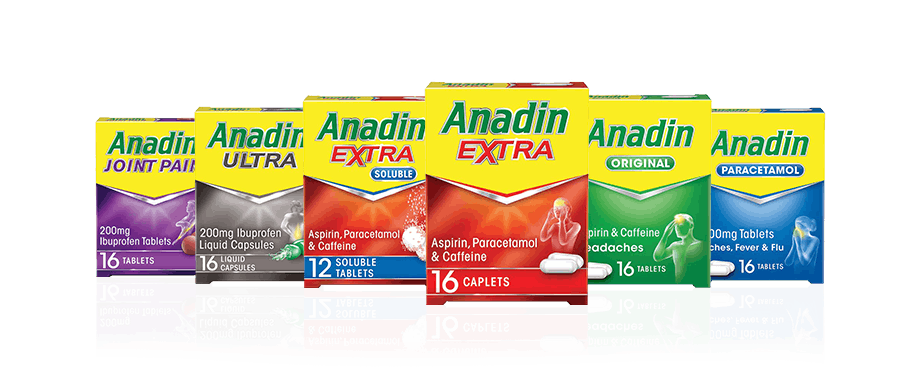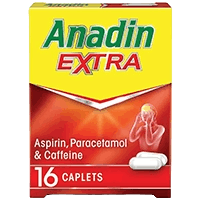Aspirin + Caffeine
Aspirin + Paracetamol + Caffeine
Anadin Extra Tablets Anadin Extra Soluble Tablets
Paracetamol
If you’ve ever had toothache, you’ll know how much it impacts your day. It can be almost impossible to focus on anything else and can leave you feeling miserable.
Toothache is a pain in or around a tooth. It can be an intense throbbing pain or a sharp pain in the tooth or jaw. It can be triggered by multiple different factors – such as tooth decay, a dental abscess or cracked tooth.
Depending on the severity of your toothache, it might be treatable at home or you may have to visit your dentist for further treatment. Visit a dentist if you have toothache that lasts more than 2 days. There are things you can do to ease the pain whilst you wait for an appointment.
A sore tooth occurs when the bacteria that lives inside your mouth creates a sticky plaque that clings to the surface of your teeth. The plaque then produces acids, which erode the hard white coating on the outside of your tooth (enamel), creating a very small hole in your tooth, known as a cavity.
Toothaches can be extremely painful due to the nerves inside your tooth. Your tooth contains a soft material known as pulp, which is filled with nerves, tissues, and blood vessels. These pulp nerves are extremely sensitive, therefore when they are irritated or infected, they cause severe toothache.
Toothache Causes
What causes toothache?
There are multiple causes of toothache, these include:
- Tooth Decay. When cavities form in your tooth, this is the primary cause of toothache in most adults and children.
- Trauma – cracked or damaged tooth. If you were involved in an accident
- Impaction. If your teeth do not fully emerge from your gums (common with wisdom teeth).
- Abscess. An infection at the root of the tooth or in the gums.
- Infection. This happens when a tooth (such as a wisdom tooth) has broken the skin, but does not have enough room to fully come through.
- Braces. Problems with your braces

Toothache Symptoms
How do I know if I have a toothache?
There are several tooth pain symptoms you should be aware of. If you experience any of the following symptoms, we recommend visiting your dentist as soon as possible.
- Sharp, throbbing or shooting pains around the tooth.
- Swelling around the gum or jaw are symptoms of tooth infection.
- Extreme sensitivity to hot or cold temperatures.
- Bleeding from the tooth or gum.
- A bad odour from the mouth.
We recommend you see a dentist if you have toothache that lasts more than 2 days, does not go away when you take painkillers, with a high temperature, pain when you bite, red gums or a bad taste in your mouth, or if your cheek or jaw is swollen.
About Wisdom Tooth Pain
Wisdom tooth pain is often caused when your mouth is overcrowded and there is not enough space for your wisdom teeth to come through properly. This usually results in the wisdom tooth getting stuck against the tooth in front of it and growing at an angle, this is known as an impacted tooth.
A great solution for wisdom tooth pain is rinsing your mouth with warm saltwater to reduce inflammation in the gums. Antibacterial mouthwash and painkillers may also help with pain. If none of the above work, then you may have to consider wisdom tooth extraction for permanent wisdom tooth pain relief.
Toothache Treatment, Medication, Relief and Prevention
How do I treat toothache?
- Over the counter painkillers or anti-inflammatories, such as paracetamol or Ibuprofen are great for reducing pain and inflammation. Try Anadin Extra Soluble Tablets which contain paracetamol, aspirin and caffeine and get to work in 5 minutes (based on caffeine absorption data)
- Rinsing your mouth with warm salt water acts as a disinfectant as it removes bacteria from your mouth whilst also reducing any swelling. Dissolve half a teaspoon of salt in a glass of warm water and rinse your mouth thoroughly and spit it out – do not swallow it. Repeat as often as you like.
- Use a pain-relieving gel for your mouth – this can be bought from pharmacies or supermarkets
- Eat soft foods, like yoghurt or scrambled eggs, and try to avoid chewing with the sore tooth (do not eat foods which are sweet, very hot or very cold)
- Do not smoke – it can make some dental problems worse
How do I prevent Toothache?
We all know prevention is better than the cure so it’s vital to practice excellent oral hygiene daily to avoid future tooth pain. To keep your teeth and gums healthy, brush your teeth at least twice a day with a fluoride toothpaste and floss or use interdental brushes at least once a day to remove food, debris and plaque.
Have regular dental check-ups and visit your dental hygienist twice a year for a professional teeth clean, which will remove plaque and tartar from hard to reach places.
Finally, reduce your intake of sugar in foods and drinks.
Again, we recommend you see a dentist if you have toothache that lasts more than 2 days, does not go away when you take painkillers, with a high temperature, pain when you bite, red gums or a bad taste in your mouth, or if your cheek or jaw is swollen.










